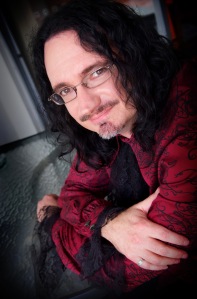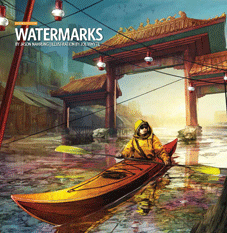Jason Nahrung grew up on a Queensland cattle property and now lives in Ballarat with his wife, writer Kirstyn McDermott. Jason works as an editor and journalist to support his travel addiction. His fiction is invariably darkly themed, perhaps reflecting his passion for classic B-grade horror films and ’80s goth rock. He has an MA in creative writing from QUT and is in his first year of a PhD in creative writing at The University of Queensland. His most recent long fiction title is the Gothic tale Salvage (Twelfth Planet Press), with his outback vampire duology Blood and Dust and The Big Smoke due out later this year with Clan Destine Press. Read it first: Pre-release Taste Test Teaser for vampires in The Big Smoke here.
Mouse: You’re country born and bred, from Queensland originally. Spent time in Melbourne, currently studying in Brisbane.
Jason: I am indeed in Brisbane at the moment, tackling the opening stages of a PhD at The University of Queensland – the creative work will use Brissie as a case study in a near future of climate change.
M: I could say something political here, but I’ll resist the temptation and go on to an obvious question instead. What took you to town in the first place?
J: One of my strongest childhood memories of Brisbane city is the stink of it: the raw, choking stench of the air as I walked up Wickham Terrace. It was a hard, grey place, crowded and loud. I never imagined living there. And yet I did, because life is like that. It took a while, but the air did not stink as it had (most days), and it was not as hard as I’d imagined. Adaptation in action. From a cattle property and a one-teacher school, to Maryborough and a high school of 600-odd kids, to university in Rockhampton (leafy, quiet, not crowded), then working in the ‘Borough, and back to Rocky, then finally to Brissie to answer the lure of culture and entertainment on a grand scale – and specifically subculture (not that you couldn’t be bashed for wearing black, mind you, but I never had any hassles). Then to Melbourne (for lurve, baby) and recently to Ballarat (for the property prices, but it has turned out to be much more than that). It is much easier to downscale: fewer roads; less traffic; easier, cheaper parking. Enough restaurants and theatres. The Big Smoke, spires in the murk on the horizon, is close enough we don’t have to go without.
M: Wait a minute. Culture took you to Brisbane. Love took you to Melbourne. Then Property prices… Maybe it’s my imagination, but does this have all the ingredients of a Once Upon a Time story – the goat herd who accepted a quest, saved a princess then built a country house/castle – in Ballarat.

Available now:
Salvage brilliantly fuses the sensitivities of mainstream fiction with the sense-of-wonder spinal chill of the genre
: Jack Dann
J: No Princesses were saved in the making of this fairy tale! When I look back at the shifts in my life, I suspect I’ve been the one rescued from the ‘Tower’ by strong, independent heroines. [Tweet this!] You know, there’s a saying that wherever you go, there you are, but it’s also true that where you are changes you: it either opens you up or closes you down, maybe both in different ways. I was running to, not from, I think; an explorer, not a refugee; one of my biggest regrets is not being able to be a farmer. To be honest, I’m still not sure what I am, but it has been shaped by all these places. The things I remember most about the places I’ve lived are the friends I made there, even the ones I left behind: the ties that unwound as well as the ones that stayed. I know what they’ve given me; I’ve got no idea what I’ve given them, other than bad puns.
M: I’d like to think our roots give us certain advantages. My bias is showing, I know, but do you see any advantage in having a background in the bush, any way a rural writer can value add.
J:Are country folk – outsiders – any better at cutting through the artifice and distraction of the urban environment, of balancing virtue against vice?
M: Maybe. More than one novel’s been built around that idea. There was a time when country meant vice and city meant virtue. But I think all writers need to find an edge to sharpen. A point of difference. Do your country roots give you any edge?
J: When I was a kid, the city was vice and the country virtue – it’s one of the Australian myths, isn’t it, that the ‘real’ Australia is in the outback (or on the beach). As it happens, I was back in the country last week, a get together of the rural community in which I grew up, one district removed. An old school mate said I hadn’t changed, for all my gallivanting. That axiom of not being able to take the country out of the boy, I suspect. I don’t know if he was right. Seems (has always seemed, since high school at the least) I’ve got one foot on the bitumen, the other in the dirt: Janus in the rural-urban divide? It’s probably not an accident that my vampire duology (Out Soon: Mouse) is called Blood and Dust and The Big Smoke. Maybe that’s where my value-adding is to be found.
M: You’re chatting about Horror at WriteFest, and I know you like shades of black. I could rather brusquely label you as Goth. Would that be fair? Or do you just have trouble with light.
J: LOL It’s true I’m not a big fan of sunlight, and the feeling’s mutual, and I certainly have a Gothic sensibility, although the days of black hair dye and eyeliner are probably over. The music collection and t-shirt drawer, and the gargoyles in the front yard, would lend the label some credence, too!
M: Your school mate said you hadn’t changed. So you’ve worn black for a long time. How did that play out for you?
J: Strangely enough, it is storytelling that has helped me fit in. In the bush, as a kid, being able to string a sentence together (without being a smartarse) was actually appreciated. My parents’ generation didn’t get much schooling, after all; my folks sacrificed to make sure I got the opportunity they hadn’t. Just the other day I got a Facebook message from a high school classmate reminding me of the (what we now call flash fiction) stories I wrote in typing class (learning touch typing: best thing ever) and passed around. The outsider from the bush found his place through academic achievement and participation (and dodging bullies – they know when you’re alone). I was certainly different to the city kids who’d come up through the same primary schools together and were talking (and not just talking) sex and music and exercising clique politics. Uni was similar: playing Dungeons & Dragons (communal storytelling) and discovering literature and developing a personal taste in music, exploring writing (but curiously not literature, I don’t know why I didn’t take lit classes).
M. So dark doesn’t have to mean dastardly.
J: Certainly not. It was the music that led me to black – Sisters of Mercy, Siouxsie, The Cult, The Cure, et al. From there to the Gothic community, largely non-existent in Rockhampton where I was working at the time. Wearing all black was a good way to cop a shoulder in the local pub, even though I kept it toned down – it’s a blue jeans kind of town. I used to wipe off the nail polish before leaving Brisbane, where I’d trawl for music and lurk in the shadows at the Goth clubs on weekends away.
Where you are changes you: it either opens you up or closes you down, maybe both in different ways.
I really don’t understand why people find a threat in black, or punk, or whatever – some sense of the unknown or the Other, I guess; constrained minds struggling to deal with something not like them, insecurities manifesting in aggression or dismissal. Which is what we try to address in our literature, isn’t it? Break down barriers, fight the lowest common denominator, explore, empathise, challenge the majority in the name of the minority. The black I wear at work is different to the black I wear at home or when I go out; that’s my concession to a company preference for professional attire. I’ve not noticed any negative feedback – my workmates in Brisbane used to call me the Black Knight, which I quite enjoyed! – but then, I guess boy writers are almost expected to wear black, aren’t they? Stoopid stereotypes.
M: Languishing in Attics – in Paris, not Ballarat. Moody. Brooding. Vulnerable. What’s not to love about boy writers.
J: I really need to polish up my absinthe-drinking skills, don’t I? It was when I embraced writing as a serious interest (in Brisbane, through the Vision writers group) that I found a community in which I felt comfortable. I certainly feel different to the mainstream, if we can pinpoint that, because of my role in the creative industries – it’s not nine to five, bank managers hate me, it feels under-appreciated in our culture whose values and priorities increasingly puzzle, frustrate and disappoint me (I am not the ultra-conservative country kid I once was). There is an uncomfortable friction between art and business and the expectations of reward from both. Many of my most valued friends are creative types now; it’s a wonderfully supporting and welcoming community. Read More






